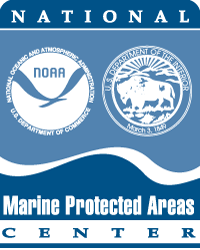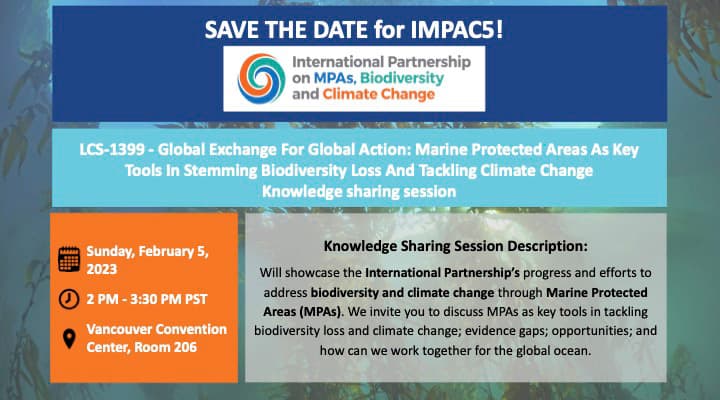International Engagement
The ocean is an interconnected and dynamic system that spans geographic boundaries, so effective marine conservation requires a collective global effort. Marine protected areas are some of the most important places in our ocean, and their health is affected by a range of external factors that transcend international boundaries, including ocean and atmospheric circulation, land- and ocean-based activities and their impacts (e.g., fisheries, shipping, coastal development, tourism), and climate change. In order to effectively protect the special marine places of the United States, we must work with our neighbor nations, international partners, and marine conservation experts and managers worldwide. The MPA Center serves as the hub for international engagement for the Office of National Marine Sanctuaries.
Our goals for international engagement are:
- Improving the effectiveness of marine resource protection
- Sharing experiences, developing our staff and leveraging resources
- Providing conservation leadership
Key International Partners
Many international programs aim to support the effective establishment and management of protected areas, including MPAs. Some key resources are listed below.
- IUCN Marine and Polar Program
- World Commission on Protected Areas – Marine
- UNESCO Marine World Heritage Program
- International Maritime Organization – Particularly Sensitive Sea Areas
- Big Ocean – Community of Practice for Very Large MPAs
- IUCN/SSC – Joint Marine Mammal Protected Areas Task Force
International MPA Capacity Building Program
ONMS' International MPA Capacity Building Team (IMPACT) helps connect protected area practitioners around the world, and to share best practices, experiences, and expertise. Tailored to share best practices in the management of MPAs and MPA networks and the specific needs of each country or region over a multi-year period, this program directly impacts and improves daily resource management efforts, addressing a wide range of management issues from management plan development to sustainable tourism to marine spatial planning.
Regional Collaborations
ONMS and the MPA Center are engaged in the following regional collaborations that support MPA networks:
- Commission for Environmental Cooperation – North American MPA Network (U.S., Canada and Mexico)
- Arctic Council – Framework for a Pan Arctic Network of MPAs
- Specially Protected Areas and Wildlife Protocol (Wider Caribbean)
Sister MPAs
These site-based partnerships allow individual MPAs or a group of MPAs to partner with their peers in other countries in order to work collaboratively on common issues and concerns and share lessons learned. Sister sites are typically linked by a variety of natural and cultural aspects: migratory species, regional ecological connectivity, invasive species, management tools, natural and cultural heritage, and community engagement.
Current sister site agreements include:
- Stellwagen Bank National Marine Sanctuary and the Dominican Republic's Silver Bank, Bermuda's Marine Mammal Sanctuary and Agoa Marine Mammal Sanctuary in the French Antilles
- Papahānaumokuākea Marine National Monument and the Phoenix Islands Protected Area in Kiribati.
- Florida Keys and Flower Garden Banks national marine sanctuaries with Guanahacabibes National Park in Cuba
- West Coast national marine sanctuaries and Papahānaumokuākea Marine National Monument with coastal and Pacific Island MPAs in Chile (in partnership with the National Park Service)
- National Marine Sanctuary of American Samoa with Palau National Marine Sanctuary
Sister site arrangements under development include:
- Florida Keys and Flower Garden Banks national marine sanctuaries with MPAs on Mexico's Gulf Coast
5th International Marine Protected Area Congress, Vancouver, WA (Feb 3-8, 2023)
NOAA is a sponsor of the International MPA Congress (IMPAC5) and is involved in many sessions and side events, including this Knowledge Exchange with the International Partnership on MPAs, Biodiversity and Climate Change.
Other Resources
- How Is My MPA Doing? A Guidebook of Natural and Social Indicator for Evaluating MPA Effectiveness (PDF)
For more information on international engagement, contact: mpainfo@noaa.gov
 Marine Protected Areas
Marine Protected Areas